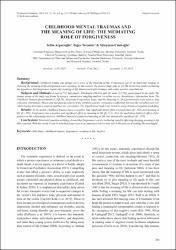Childhood mental traumas and the meaning of life: The mediating role of forgiveness
Citation
Arpacıoğlu S., Turanlar T., Çakıroğlu S. Childhood mental traumas and the meaning of life: The mediating role of forgiveness (2024). Psychiatria Danubina, 36(3): 351-358.Abstract
Background: Childhood trauma can disrupt one’s sense of the meaning of life. Forgiveness can be an important strategy in
restoring the meaning of life and gaining a new meaning. In this context, the present study aims to test the theoretical model evaluating
the hypothesis that forgiveness repairs the meaning of life deteriorated after traumas and makes positive contributions.
Subjects and Methods: A total of 552 individuals, 369 female (66.8%) and 183 male (33.2%), participated in the study. The
sample group of the study was found by using a convenience sampling method via online survey. Introductory information form, The
Childhood Trauma Questionnaire (CTQ-28), Heartland Forgiveness Scale, and the Meaning in Life Questionnaire were used as data
collection instruments. Means and standard deviations of the variables and the correlation coefficients between the variables were cal culated using descriptive analysis and Pearson correlation. The hypothesized model was tested by using structural equation modelling.
Results: In the model, childhood traumas have a negative and significant direct effect on forgiveness (β:-.362) and meaning in
life (β:-.256). Forgiveness has a positive and significant effect on meaning in life (β:.715). Also, the mediating (indirect) effect of for giveness in the relationship between childhood mental traumas and meaning in life was statistically significant (β:-.259).
Conclusions: Structural equation modeling showed that forgiveness was the mediating variable affecting changing meaning in life
after traumas. With this result, it can be said that forgiveness is an important intervention tool in the process of making life meaningful.
Source
Psychiatria DanubinaVolume
36Issue
3URI
https://www.psychiatria-danubina.com/UserDocsImages/pdf/dnb_vol36_no3-4/dnb_vol36_no3-4_351.pdfhttps://doi.org/10.24869/psyd.2024.351
https://hdl.handle.net/20.500.12780/1001


















